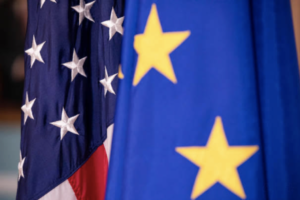
By Sam Parker, Treasurer at King’s Commercial Awareness Society
The United States Government has recently passed a landmark federal law titled ‘The Inflation Reduction Act’ and referred to as ‘IRA’. This aims to curb inflation in the US by reducing the deficit, improving Medicare affordability and increasing investment in sustainable domestic energy production. The Act promises a 40 percent reduction in carbon emissions by 2030 with £369 billion of tax going towards energy security and climate change programmes. It is widely agreed that this new Act makes the current administration the most proactive against climate change in US history. However, many problems affecting global trade have been foreseen by various European officials, who are worried about what the Act means for a huge quantity of European businesses that may find it much harder to compete with American companies.
What this means for Europe
The primary cause of concern for the European Commission is the promotion of unequal competition brought on by the subsidies for green industries, such as energy and transport, not being extended to Europe by the US government. Many EU trade ministers are characterising the US as ‘too protectionist’ and are calling for amendments to the Act as well as a monitoring of its implementation. Although a task force has been set up to address these concerns, little has been done and there is a lack of confidence in Congress being willing to negotiate any significant changes to the Act. With a bleak outlook for European industry, many EU companies are already looking to the US for their next investment. The situation for European trade is looking increasingly worse and with a shared energy crisis, a war and a recession looming ahead, the route to prosperity and growth in Europe appears to be even harder than before.
Mitigation and Strategy
A transatlantic trade war is a serious prospect and will become the likely route if discussions between diplomats are fruitless. This will be initiated by the EU and will be done through subsidising European companies in the same industries that the US has given the $369 billion to. We could end up in a tit-for-tat scenario in which both sides try to overpass each other in subsidising domestic energy production and manufacturing, leading to both sides being worse off.
The European Commission and US administration leaders will discuss solutions in the next EU-US tech and trade summit on December 5th. This may be the defining moment for transatlantic trade for the foreseeable future since they will discuss how effective the task force has been in finding a solution for European trade. The meeting gives the Commission an optimal chance to re-strategise and evaluate a range of drastic measures that may lead to an inevitable trade war. This may be the point at which the World Trade Organisation is contacted, leading to regulatory action in the EU, such as tariffs on the US and an increase in subsidies to domestic industries.
At first glance, the Inflation Reduction Act seems like a much needed and net positive piece of legislation for the USA and the world, but on closer inspection one discovers that the Act may cause problems worse in magnitude than the ones it solves. Not only might trade in Europe be affected, but the US may be harming itself with the new policy. The problem does not lie in the types of subsidies being given, such as the consumer $7,500 tax credit granted for the green automotive industry. Instead, it lies in much of the other spending on the Act, such as the $300 billion down-payment towards the deficit, which is deemed financially responsible. The real and glaring problem is the implementation of this Act and how it creates an unfair playing field, favouring American industry on the world stage. These green industries must be encouraged, but this cannot be to the detriment of good trade relations with Europe at a time of increasing need for Western unity.